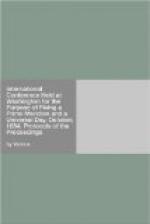I would suggest, however, that, instead of making a positive declaration upon the question, we leave it as it now stands; that is to say, that longitude shall be counted east and west from the prime meridian, without specifying which direction shall be considered positive, and declare it to be the opinion of this Congress that it is not expedient to change the present method of counting longitude both ways from the prime meridian.
Count LEWENHAUPT, Delegate from Sweden. In my opinion the delegates have not undertaken to recommend the resolutions adopted by a majority of the Conference, but only the resolutions for which they have themselves voted. As regards the fact that there may be great differences of opinion concerning the questions which remain for our consideration, I am unable to see in it any reason for our not proceeding to vote upon them. On the contrary it will be of great interest to our Governments to know the exact position taken by each of the delegates, and even if any delegate should abstain from voting, such abstention would be of interest in the event of future negotiations on the subject. I am therefore of opinion that we should proceed to vote on the remaining resolutions.
The vote was then taken upon the resolution of the Delegate of the United States, Mr. RUTHERFURD, which is as follows:
“Resolved, That from this meridian (id est, Greenwich) longitude shall be counted in two directions up to 180 degrees, east longitude being plus and west longitude minus.”
The following States voted in the affirmative:
Chili, Liberia, Colombia, Mexico, Costa Rica, Paraguay, Great Britain, Russia, Guatemala, Salvador, Hawaii, United States, Japan, Venezuela.
The following States voted in the negative:
Italy, Sweden,
Netherlands, Switzerland.
Spain,
The following States abstained from voting:
Austria-Hungary, Germany, Brazil, San Domingo, France, Turkey.
Ayes, 14; noes, 5; abstaining, 6.
The PRESIDENT then announced that the resolution was adopted.
Mr. RUTHERFURD, Delegate of the United States. Mr. President, I now propose to read the third resolution from the printed circular which has been furnished to the delegates. It is as follows:
“Resolved, That the Conference proposes the adoption of a universal day for all purposes for which it may be found convenient, and which shall not interfere with the use of local time where desirable. This universal day is to be a mean solar day; is to begin for all the world at the moment of midnight of the initial meridian coinciding with the beginning of the civil day and date of that meridian, and is to be counted from zero up to twenty-four hours.”
This resolution is somewhat complex, and in order to facilitate debate, I propose that we first occupy ourselves only with the first clause, namely:




